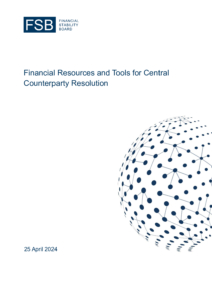Press enquiries:
+41 61 280 8477
[email protected]
Ref: 9/2024
-
New standard aims to ensure that resolution authorities have ready access to a set of resolution-specific financial resources and tools, as well as any unused recovery resources, to support the orderly resolution of a central counterparty (CCP).
-
Standard requires that adequate liquidity, loss-absorbing, and recapitalisation resources and tools are available to maintain the continuity of a CCP’s critical functions and mitigate adverse effects on financial stability should resolution become necessary.
-
FSB will monitor implementation for CCPs that are systemically important in more than one jurisdiction and publish findings in its annual Resolution Report.
The Financial Stability Board (FSB) published today a report on financial resources and tools for CCP resolution.
The availability of adequate resources and tools for CCP resolution remains critical for financial stability and for ensuring confidence in the financial system. Progress in implementing the G20 regulatory reforms agreed after the 2008-09 financial crisis, including the central clearing mandate, has increased the systemic importance of CCPs. While material advances have been achieved to enhance the resilience and recovery of CCPs, it is also necessary to ensure that adequate financial resources and tools are available in resolution to maintain the continuity of critical functions and safeguard financial stability, should resolution become necessary.
Consequently, the FSB has developed a global standard for financial resources and tools to facilitate the orderly resolution of systemically important CCPs with two expectations:
-
Resolution authorities of systemically important CCPs should have access to a set of resolution-specific resources and tools, in addition to recovery resources and tools where these are available to the resolution authority. The resolution toolbox should include a combination of resolution-specific resources and tools from the list of seven in the report. Not all seven resources and tools need to be included. Financial resources and tools have different strengths and weaknesses, and no single resource or tool would be sufficient by itself to meet the resolution objectives.
-
Jurisdictions should make their approach to calibrating the resolution-specific resources and tools in the toolbox transparent.
The FSB will monitor implementation for CCPs that are systemically important in more than one jurisdiction through the FSB’s regular monitoring tools. The findings will be aggregated and published in the FSB’s annual Resolution Report.
Notes to editors
In March 2022, the FSB, the Bank for International Settlements’ Committee on Payments and Market Infrastructures (CPMI), and the International Organization of Securities Commissions (IOSCO) published a joint report on CCP Financial Resources for Recovery and Resolution. Following the publication of the joint report, the FSB decided, in April 2022, to undertake further qualitative work on financial resources and tools for systemically important CCP resolution and published a consultation report on its proposals in September 2023.
Implementation of the toolbox approach would be achieved through amendments to the Financial Market Infrastructure Annex to the Key Attributes and to the 2020 Guidance on Financial Resources to Support CCP Resolution and on the Treatment of CCP Equity in Resolution.
The Resolution Report is prepared annually by the FSB Resolution Steering Group, which is the primary global forum for the development of standards and guidance for resolution regimes, planning, and execution for systemically important financial institutions (SIFIs).
The FSB coordinates at the international level the work of national financial authorities and international standard-setting bodies and develops and promotes the implementation of effective regulatory, supervisory, and other financial sector policies in the interest of financial stability. It brings together national authorities responsible for financial stability in 24 countries and jurisdictions, international financial institutions, sector-specific international groupings of regulators and supervisors, and committees of central bank experts. The FSB also conducts outreach with approximately 70 other jurisdictions through its six Regional Consultative Groups.
The FSB is chaired by Klaas Knot, President of De Nederlandsche Bank. The FSB Secretariat is located in Basel, Switzerland and hosted by the Bank for International Settlements.
